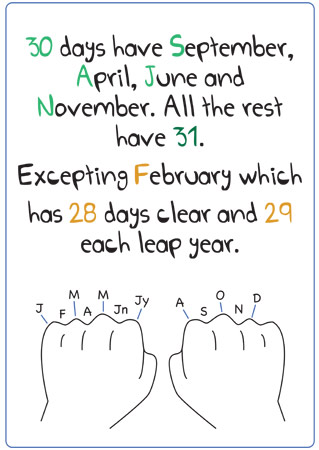Year 4 have been learning to tell the time. By the end of the school year, the age related expectations require children to be able to:
- read, write and convert time between analogue and digital 12- and 24-hour clocks
- solve problems involving converting from hours to minutes; minutes to seconds; years to months; weeks to days
Yesterday, the class focused on seconds, minutes, hours, days, weeks, months, years, centuries and a millennium. We converted different units of time and solved a few problems. We would like to encourage the children to practise telling the time as often as possible. Test your child on questions such as:
How many seconds in 4 minutes?
How many hours in 5 days?
Which months of the year have 30 days?
Which is the longest amount of time? 360 minutes or 5 hours
Harry takes part in a sponsored silence.
He says, “If I am silent for five hours at 10p per minute, I will raise 50 pounds.”
Do you agree with Harry? Explain why.
Sally is 7 years and 2 months old. Macey is 85 months old. Who is the oldest? Explain your answer.
True or false
3 days is >than 72 hours
2 and a half years =29 months
11 weeks 4 days <10 weeks 14 day
To help with this learning, the class rehearsed a poem that involved knuckles!
Make a fist.
If the month is on a knuckle, it has 31 days. Otherwise is has 30 or less days.
Starting with the 1st knuckle as January,
The space between knuckles as February,
2nd Knuckle is March… etc.
Once you get to the fourth knuckle, July, start over at the first knuckle for August.
Below is an activity that was completed in class. It is a short RIC starter that was used within a maths lesson. RIC stands for Retrieve, Interpret and Choice. These activities require children to read, watch, observe or listen to a stimulus and then answer some questions.
LO: RIC
